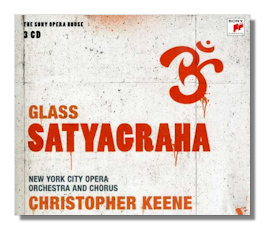
The Internet's Premier Classical Music Source
Related Links
-
Glass Reviews
- Latest Reviews
- More Reviews
-
By Composer
-
Collections
DVD & Blu-ray
Books
Concert Reviews
Articles/Interviews
Software
Audio
Search Amazon
Recommended Links
Site News
 CD Review
CD Review
Philip Glass

Satyagraha
- Claudia Cummings - Miss Schlesen, soprano
- Sheryl Woods - Mrs Naidoo, soprano
- Rhonda Liss - Kasturbai/Mrs Alexander, alto
- Douglas Perry - M.K. Gandhi, tenor
- Robert McFarland - Prince Arjuna/Mr Kallenbach, baritone
- Scott Reeve - Parsi Rustomji/Lord Krishna, bass
New York City Opera Chorus
New York City Opera Orchestra/Christopher Keene
Sony 8869-752723-2
This 3-CD set from Sony is a reissue of the reference – indeed the only – recording of Satyagraha, on CBS Masterworks (MK39672) first released in 1984. Satyagraha is the second in Philip Glass' (b. 1937) "Portrait Trilogy" of operas about people who have changed the world… Einstein on the Beach and Akhenaten are the first and third. Each of Satyagraha's three acts (actually written with the length of a CD, and even of a tape cassette, in mind) references a different figure… Leo Tolstoy, Rabindranath Tagore, Martin Luther King.
Composed in 1979 to a libretto in Sanskrit by Constance DeJong and Glass himself, Satyagraha (may best be translated as "insistence on truth" and is associated with Gandhi's principle of non-violent resistance to injustice) is loosely based on the life of Gandhi and is scored for soloists, a large chorus, and orchestra of only strings and woodwinds.
The opera was commissioned by the city of Rotterdam and premièred at the Stadsschouwburg there in 1980; Bruce Ferden conducted the Netherlands Opera and the Utrecht Symphony Orchestra. This first and only recording was made in RCA Studio A in February and March 1984 almost three years after Satyagraha's North American première. The original CDs became hard to find and many Glass aficionados had to rely on an LP version.
Perhaps the most tonally conventional of Glass' trilogy, Satyagraha is also the one which can best be appreciated without seeing the stage production, of which there were several in the UK and Europe during the 30 years after its composition. Imbued with a confidence, certainty and simple sense of the ways in which music can explain, expose and extend political thought, Satyagraha places greater emphasis on ideas than on characterization.
Satyagraha exhibits many of the familiar minimalist Glass traits: insistent arpeggios, regular rhythms, slowly shifting keys. And it's based on an almost Expressionist declamatory style by both soloists and chorus of the text from the "Bhagavad Gita" – perhaps analogous to the way in which Stravinsky chose Latin for distance and detachment in Oedipus Rex.
Each of the soloists finds exactly the right tone in which to approach the text and the music: a somewhat "starchy" distance between what most of them will surely know about their character and the almost stylized progression of events. But the technical prowess of the singers is everything it needs to be. There is no coldness, nothing perfunctory. They all inhabit their roles well and the whole is convincing and full of impact. A new recording of Satyagraha might well take into account the criticisms of Glass' insistent, driving "minimalist" melodies; it might attempt to introduce a style that emphasized a wider sense of phrasing and themes. This, make no mistake, is Glass captured when he was still new and categorized quite simply as an unashamed "minimalist".
The phases of the opera are presented not as tableaux; but as selections extracted from everyday life. This stylized realism adds to the work's approachability and draws us in more than would a monolithic insistence or use of slogans related to Gandhi's achievements. The themes thus stay – or become – real and credible. By themselves they would make an impact because of the tension between protagonists and their aspirations against the status quo. Yet the opera only becomes opera when the music embodies what these events meant to the struggle for dignity, recognition and justice: Gandhi's resistance to racial oppression in South Africa, strikes, disobedience. It's in this context that the Sanskrit lends pathos, depth and weight to historical narrative. And the variety in tonality, in tempi and to some extent even in textures builds a sense of momentum and progression in the listeners' awareness in the same way as in Akhenaten; but to a greater extent than is the case in Einstein on the Beach.
Sony has done a very good job of re-engineering the recording: it's sharp, forward, clean and easy to listen to, without sounding too bright or metallic. The dynamic is certainly less full than it might well be if a recording were made now. If there is a disappointment with this release, it's the absence of adequate documentation: the 24-page booklet contains only the cast and a short synopsis, in English, French and German. No libretto; no background to the recording or opera. If you missed the CBS CD set (which still shows as unavailable on ArkivMusic, H&B Direct, and only "Used" at about twice the retail price on Amazon) and/or want a work which, although very much of its time, is vintage Glass, you should buy this reissue and relax into Glass's unmistakably focused world.
Copyright © 2015, Mark Sealey





















